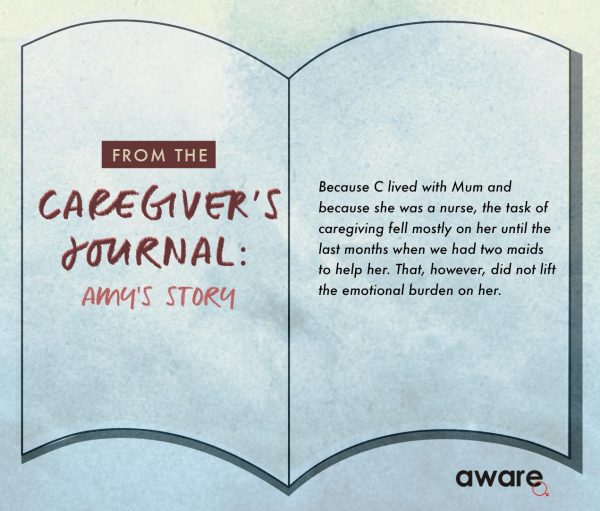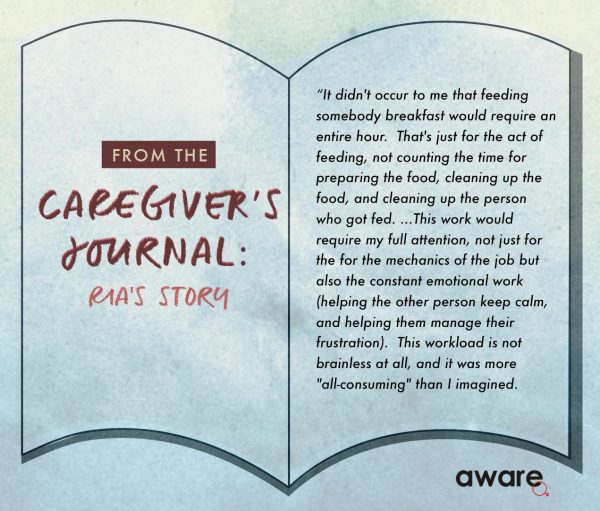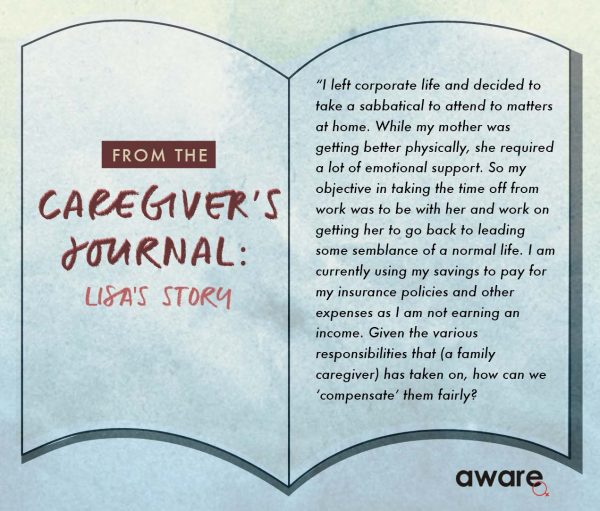
Our “Your Stories” series are submissions shared with us via email or in one-on-one interviews, for the purposes of our research and campaigns. All names have been changed (unless the use of real names was explicitly permitted by the author), and we have sought permission to publish from the authors/interviewees themselves. The opinions expressed in these posts do not represent those of AWARE.
My mother has Parkinson’s Disease (PD) and my father is the primary caregiver. For several years, her condition was under control with medication and my mother still led a pretty normal life, enjoying overseas trips with my dad and going on shopping trips with me about town. So while I was building my corporate career, my father through the years slowly took over the management of the household from her.
Unfortunately, last April, her condition took a turn for the worse when she had a fall and injured her spine. Her rehabilitation required more care and attention, she needed help to get up, sit down, go to the toilet and move from room to room in the house. This took a toll on my father and he became sick with a severe cough. My helper and I both caught the bug and that was when I realised that this situation was long term and I needed to do something about it.
Leaving the workforce
As a result, I left corporate life and decided to take a sabbatical to attend to matters at home. While my mother was getting better physically (on good days she could move about on her own), she required a lot of emotional support. PD patients tend to shun social interaction especially when there is a marked change to their lifestyle, and she was no exception. So my objective in taking the time off from corporate work was to be with her and work on getting her to go back to leading some semblance of a normal life.
Her condition worsened in November last year so it took a lot of emotional support to help her overcome her fears and depression due to this setback. All this time, my father has cared for her without complaint and given what he has taken on for the family in the past, he truly is an exceptional man. There were moments of frustration but he soldiers on, waking up sometimes 3 to 4 times in the night to help her go to the toilet, bathing her and making sure she gets her injections at night.
On top of this, he still works part time twice a week in the afternoon as a locum at his friend’s clinic, and in December, took on extra work load because all the doctors went on leave for the school holidays. The strain of the sudden longer working hours and the care of my mother took a real toll, to a point where he fainted one day when doing the gardening. Thankfully, he did not injure himself seriously but it gave the family a scare and it also impressed upon me the progressive frailty of both my parents.
The many facets of caregiving
Since then, I have taken over the management of the household, running all the marketing errands and planning most of the meals. As the secondary caregiver, I manage my time to ensure that I am around at home if my father isn’t. Sometimes my mother will need help to align her posture so she can breathe more easily or on her not-so-good days, she needs help to go to the toilet etc. To relieve my father, I handle my mother’s breakfast in the mornings, make sure she is settled in after that with the papers to read and usually in the evenings, I will accompany her to the bathroom while she brushes her teeth and completes the rest of her night routine before bed.
Feeling the financial pressures
This has also meant that it will be impossible for me to go back to corporate life. Hence, I am going through a career transition, attending classes to up skill myself in order to find work that will allow me the flexibility to look after both parents.
I also wonder about finances. I am currently using my savings to pay for my insurance policies and other expenses as I am not earning an income. So what is the actual cost being borne by the caregivers? There are tangibles like loss of income but what about the opportunity cost e.g. when a caregiver puts their career on hold to care for loved ones or finances the medical care of the loved one (like in the case of a good friend) using their own CPF/Medisave?
Not all families have good relations and some caregivers have to bear the majority of the financial cost on their own despite having other family members. While we can argue that this is all subjective and I do agree that each family comes with their own set of history and dynamics amongst the members, there eventually is ONE family member who will be the primary caregiver.
Given the various responsibilities that person has taken on, how can we ‘compensate’ them fairly? The reality is that if not one family member was able to care for the patient, the person would be placed in a nursing home or have a professional nurse/helper to care for them. In the latter case, this involves financial cost for the hired help’s time, effort, and includes benefits and protection. But this is not accorded to the caregiver who is a family member. I believe there is some form of tax relief but this is not the same as income relief.
Furthermore, there is the value of emotional support. How do we measure something that is so intangible, assuming that there are positive results associated with the love, care and attention of a family member versus a non-family member?
As Singapore takes on an ageing population, such circumstances become more common and how are we as a society going to deal with this?
This anonymised account has been reproduced with the permission of the author.
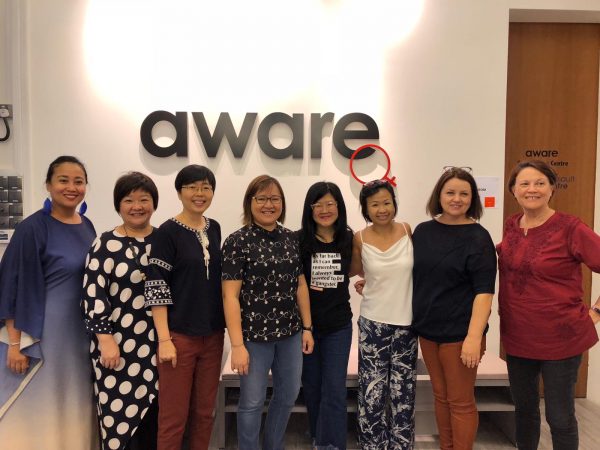





 Nurul Huda is an educator, writer, and image-maker. Lecturing in different subjects across Anthropology, Liberal and Visual Arts, she commutes across different classrooms with a love for facilitation and performance. She is also a researcher whose interests focus on issues concerning the visual and sentient body, visual imagery and methodologies, narratives (text and the telling), and feminism. She received both her BA and MA in Anthropology from the National University of Singapore and has since been teaching in several universities in subjects such as Anthropology, Liberal Arts, and Visual Studies.
Nurul Huda is an educator, writer, and image-maker. Lecturing in different subjects across Anthropology, Liberal and Visual Arts, she commutes across different classrooms with a love for facilitation and performance. She is also a researcher whose interests focus on issues concerning the visual and sentient body, visual imagery and methodologies, narratives (text and the telling), and feminism. She received both her BA and MA in Anthropology from the National University of Singapore and has since been teaching in several universities in subjects such as Anthropology, Liberal Arts, and Visual Studies.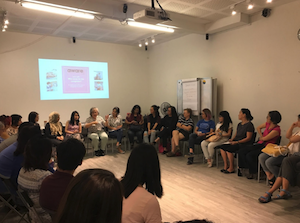
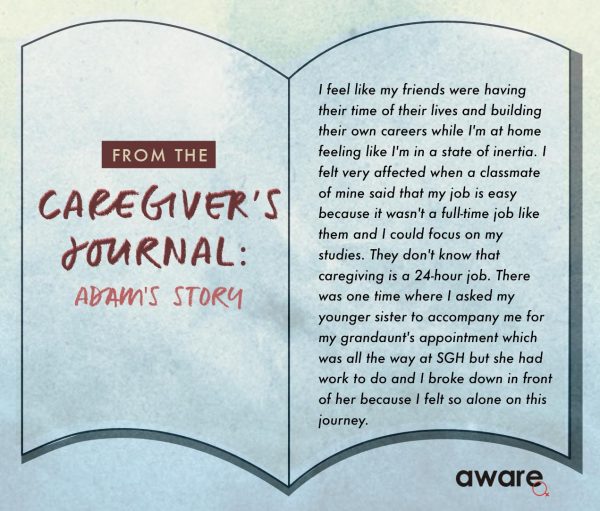
 Recent news reports discussing New Naratif’s failed bid for registration have occasioned a disquieting level of vitriol in some online conversation (“Acra rebutts duo behind New Naratif website over foreign influence”, 12 Apr).
Recent news reports discussing New Naratif’s failed bid for registration have occasioned a disquieting level of vitriol in some online conversation (“Acra rebutts duo behind New Naratif website over foreign influence”, 12 Apr).
